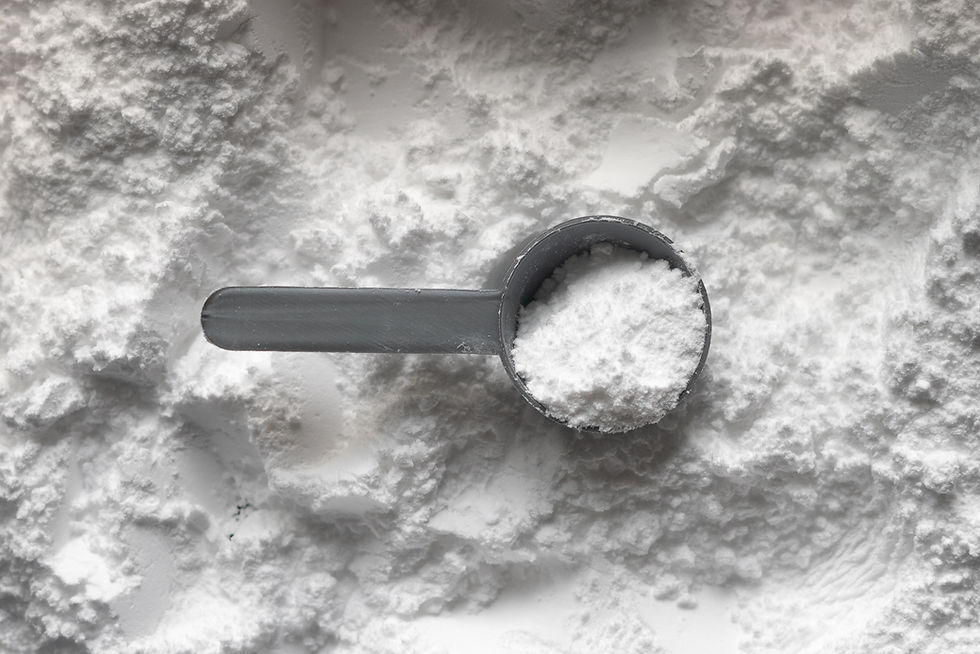Six Best Supplements to Gain Muscle
- Cheriece DeCou

- Oct 26, 2022
- 4 min read

Regular exercisers want to make sure that their workouts are effective.
The growth of muscles and strength is a major advantage of exercise. Your capacity to exercise and conduct daily activities normally depends on your level of muscle mass.
Maximum muscle gain requires three things: eating more calories than you burn off, eating more protein than you consume, and working out in a way that challenges your muscles (1Trusted Source, 2Trusted Source, 3Trusted Source).
Even though you can fulfill each of these needs without using supplements, some supplements may be able to aid you in reaching your objectives.
The six supplements listed below could aid in your efforts to build muscle while working out.
1. Weight Gainers
Weight gainers are dietary supplements created to make consuming more calories and protein more convenient. People who have trouble gaining muscle tend to use them.
Even when they consume a lot of calories and lift weights, some people have trouble adding muscle. Weight gainer supplements can range in their calorie counts, but it's not unusual for them to have over 1,000 calories per serving. Due to its significance in helping people build muscle, many people believe that these calories come from protein. The majority of the calories, however, come from carbohydrates. These high-calorie supplements typically contain 20–60 grams of protein and 75–300 grams of carbohydrates per serving. It's important to understand that weight loss is not a magical process, even though these products can help you consume more calories.
Overall, it is only advised to use weight gainers if you are having trouble eating enough and find it easier to drink a weight gainer shake than to eat more actual food.
2. Beta-Alanine
An amino acid called beta-alanine can lessen fatigue and possibly improve exercise performance. Additionally, if you are exercising, beta-alanine might help you gain muscle mass.
In one study, college football players and wrestlers who took 4 grams of beta-alanine daily for eight weeks had more lean body mass than those who took a placebo.
Another study showed that a six-week, high-intensity interval training program that included beta-alanine supplements increased lean body mass by about one pound (0.45 kg) more than a placebo.
While more research is required, beta-alanine may support muscle gain when used in conjunction with an exercise regimen.
3. Creatine

Your body naturally produces the molecule creatine. It provides energy to your muscles and other tissues. Contrarily, taking it as a dietary supplement can raise the level of creatine in muscles by up to 40%.
The impact on your muscle cells and exercise performance promotes muscle growth. In fact, a ton of research shows that creatine increases muscle strength.
This is fantastic news for those who want to put on weight. Having more strength makes it easier to exercise more effectively, which helps you build muscle mass over time. Creatine may also cause your muscle cells' water content to increase. As a result, your muscle cells may slightly swell, and signals for muscle growth may be generated. Additionally, IGF-1 and other muscle-growth hormones may be increased by this supplement.
Overall, a lot of research has been done on the relationship between exercise and creatine supplements, and it is evident that creatine can help increase muscle mass.
4. Supplements with protein
Consuming an adequate amount of protein is required for muscle gain. If you want to gain muscle, you must consume more protein than your body naturally breaks down. Even though protein-rich foods can provide all of the protein you need, some people find it difficult to do so. If this describes you, you should consider taking a protein supplement.
Whey, casein, and soy protein are three of the most popular protein supplements, but there are many more. Other protein supplements contain protein isolated from eggs, beef, chicken, or other sources.
Increasing protein intake through supplements, according to research, results in slightly more muscle gain in people who exercise than increasing carbohydrate intake. Those who aren't, on the other hand, are likely to suffer the most.
5. HMB

HMB (beta-hydroxy beta-methylbutyrate) is a molecule produced by your body when it processes the amino acid leucine.
Some of the beneficial effects of protein and leucine in the diet are attributed to HMB.
It may be especially important for reducing muscle protein breakdown.
While your body produces HMB naturally, taking it as a supplement allows for higher levels and may benefit your muscles.
Several studies in previously untrained adults have shown that taking 3-6 grams of HMB per day can improve weight-training-induced gains in lean body mass.
Other research, however, indicates that similar doses of HMB are unlikely to be effective in increasing muscle mass in adults with weight training experience.
This may mean that HMB is most effective for those who are getting started with exercise or increasing the intensity of their workouts.
6. Branched-Chain Amino Acids
Leucine, isoleucine, and valine are the three individual amino acids that make up branched-chain amino acids (BCAAs).
The majority of protein sources contain them, especially those that are derived from animals like meat, poultry, eggs, dairy products, and fish.
About 14% of the amino acids in your muscles are BCAAs, which are crucial for muscle growth. Most people get their daily intake of BCAAs from food, but taking BCAA supplements is also very common. In comparison to a placebo, a small amount of research suggests that BCAAs may enhance muscle gain or minimize muscle loss.
BCAAs may not lead to greater muscle gain in people who are exercising, according to other research.
It's likely that taking BCAA supplements will only help you if your diet is deficient in high-quality protein.
While they might be helpful if your diet is deficient, more research is required before BCAAs are suggested as the go-to supplement for muscle growth.




Comentários